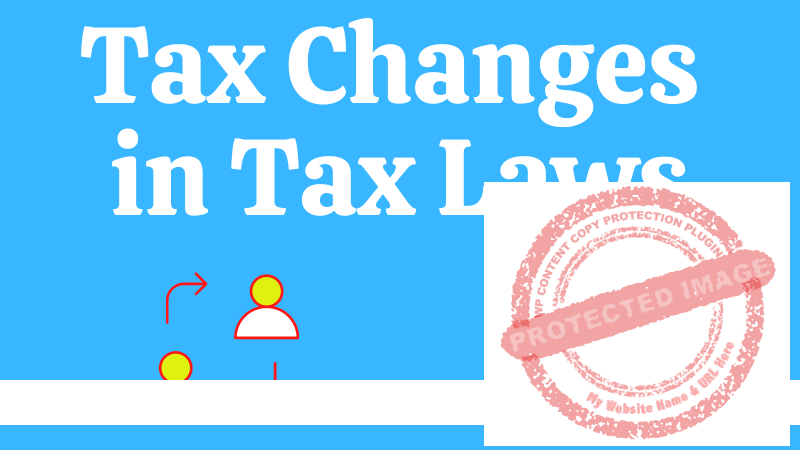Tax changes in tax laws is a post written in 2020. However the fundamentals about tax chnages still hold.
Introduction
Tax Laws (Amendment) Bill 2020 has finally become law. It is now an Act of Parliament as Tax Laws (Amendment) Act, 2020.
This is good news… but… the question is: How will the tax changes introduced in the Tax Laws (Amendment) Bill, 2020 due to COVID-19 affect our tax compliance?
Many years ago, while training as a young tax officer straight from the University, one lecturer, Mr. Kimani, was specific on the functions of the three arms of government: The Executive, the Legislature, and Parliament. He insisted that none is more potent than the other in enacting tax laws. The three arms go government work in tandem, complementing each other.
Fast forward to April 2020.
The President announced various changes, among them tax changes, to mitigate the vagaries of COVID-19 on the lives of Kenyans and the economy. Kenyans were happy with the announcements expecting the tax changes to take effect immediately. But alas, I remembered Mr. Kimani’s words: the three arms of the government should work in tandem.
The President’s announcements were proposals not fully implementable as law…that needed Parliament’s approval to be enacted into law by the Judiciary. I held my chickens; maybe I was overthinking. I patiently waited for the Gazette Notice on the tax changes. Only the proposed VAT changes were Gazetted, while all the other tax changes were left out.
I wondered why.
Someone probably had whispered that the Executive alone does not make tax laws in this country. Any tax changes proposed by the Executive must be taken to Parliament in the form of a Bill to be debated and either approved or rejected.
That was done in the Tax Laws (Amendment) Bill, 2020, which was taken through three stages in Parliament. Later, the Tax Bill was taken to the President for approval: this was done on 25th April 2020. This was a whole month since the tax changes were proposed.
On 22nd April 2020, Kenya Revenue Authority, in a Public Notice of 02/04/2020, informed the public about tax legislative changes contained in Legal Notice No. 35 of 2020 and the Business Laws (Amendment) Act, 2020. In the Public Notice,
KRA informed the public that the VAT rate changes would take effect from 1st April 2020 for VAT returns submitted after April 2020. KRA simply told the taxpayers that the old tax rates were still effective until the Tax Laws (Amendment) Bill 2020 was enacted.
That must have shocked many Kenyans, but it was a painful reality.
That was not what many Kenyans were expecting. On 25th April 2020, the President assented to the Tax Laws (Amendment) Bill, 2020, and from that day, it became an Act of Parliament, Tax Laws (Amendment) Act, 2020.
.
What does Tax Laws (Amendment) Act, 2020 contain?
The Act contains many beneficial changes to the taxpayer.
a. Commencement
1. Section 1(a) on the amendment of the Value Added Tax Act, 2013 – 1(a) ‘in the case of the amendment to section 5(2) of the Value Added Tax Act, 2013, on the 15th day of the next month following the assent”
This means that the VAT rate reduction from 16% to 14% is effective from 15th May 2020 and if any person (me included) has been charging VAT at the rate of 14%, may have broken the VAT laws as provided for under Value Added Tax Act, 2013 in the country.
However, do not worry.
The National Treasury (the Executive) published a Gazette Notice on the reduction of VAT rate from 16% to 14%. The VAT Act gives the Cabinet Secretary to the National Treasury powers to do that. The Executive has given two dates for VAT rate change commencement: 1st April 2020 according to the Gazette Notice and 15th May 2020 according to Tax Laws (Amendment) Act, 2020.
The National Treasury and Kenya Revenue Authority should address this anomaly and align the two effective dates.
The date in the Act should be amended to read 1st April 2020 because there was a Gazette notice to that effect and taxpayers changed the VAT rate from 16% to 14%.
2. Section 1(b) on amendments in the Income Tax Act, Cap 470, -“for all other provisions of the Act, on the date of the assent”. This means that the commencement date for the tax changes under income tax will be 25th April 2020. These are tax changes under PAYE, personal income tax, corporate income tax, and Turnover tax.
Laws are not applied retrospectively unless where specified. Therefore, it is from the assent date that the law becomes effective.
What are the specific tax changes?
The following are the specific tax changes under the Tax Laws (Amendment) Act, 2020:
Income Tax Act Cap 470
There were various changes under the Income Tax Act Cap 470.
a. Pay As You Earn Rates
i. Rates
The highest applicable PAYE rate is now 25% on emoluments to employees and directors, and pensions. For any compensation before this date, the highest PAYE rate was 30%. PAYE is accounted for monthly. Hence, this change will affect PAYE for April 2020 onwards. The following are the new tax rates on emoluments to employees and directors and pensioners.
Compensation for employees and directors per year
Per year Per month Rate
On the first kshs 288,000 kshs 24,000 10 %
On the next kshs 200,000 kshs 16,667 15%
On the next kshs 200,000 kshs 16,667 20%
Income < kshs 688,000 kshs 57,334 25%
ii. Pension rates
Any pension income in excess of tax-free amounts:
On the first kshs 400,000 – 10 %
On the next kshs 400,000 – 15%
On the next kshs 400,000 – 20%
On income < kshs 1,200,000 – 25%
iii. PAYE exemption
The employee’s and director’s compensation amount that is exempted from PAYE from 25th April 2020 is kshs 24,000. Again PAYE is accounted for monthly and hence, the first PAYE exemptions will start with April 2020 PAYE.
iv. Personal relief
Personal relief has been an increase from sixteen thousand eight hundred (kshs 16,800) to twenty-eight thousand eight hundred (kshs 28,800) per year. This translates to kshs 2,400.
b. Corporate income tax
i. Rate
The resident corporation tax rate from 25th April 2020 has been reduced from 30% to 25% of taxable income. Corporation tax is accounted for yearly but tax is paid continuously on instalment basis. For any year of income that had ended, the tax rate is at the rate of 30%. In any case, the taxpayers should have paid 100% tax by the 4th instalment tax payment.
For example, for taxpayers whose year of income ends in December, they should have paid 100% of their expected income tax for the year of income 2019 by the fourth instalment which was on or before 20th December 2019. Any instalment tax from 25th April 2020 will be at the rate of 25%.
c. Personal income tax
i. Rate
The personal income tax rate from 25th April 2020 has been reduced from 30% to 25% of taxable income.
ii. Instalment tax
For individual taxpayers whose income tax per year is more than kshs 40,000, they are expected to pay the tax on instalment basis four times by the 20th of April, 20th of June, 20th of September, and 20th of December. This means that the first instalment by 20th April 2020 should have been based on 30% while subsequent instalment payments after 25th April 2020, the tax rate will be 25%.
iii. PAYE
The final personal income tax is established on a progressive basis using PAYE rates. Current reduced PAYE will be used to establish the income tax for individual taxpayers by 30th April 2021.
iv. Personal Relief
Personal tax relief at the rate of kshs 2,400 per month or kshs 28,800 per year applies to personal income tax.
d. The Turnover Tax
i. Rate
From 25th April 2020, the tax rate for Turnover tax is 1% on the monthly sales. Turnover tax is payable monthly. Hence, Turnover tax for April 2020 which is payable by the 20th May 2020 will be at the rate of 1%. For those taxpayers who had not paid Turnover tax for up to and including March 2020, the tax rate is still 3%.
ii. Turnover tax threshold
Turnover tax lower threshold has been increased to kshs 1million. This means that Kenyans with a turnover of less than kshs 1million should not register for Turnover tax.
iii. Late Tax Returns
The penalty for late submission of Turnover tax returns has been reduced from kshs 5,000 to kshs 1,000 for each tax return that is not submitted to KRA by the 20th day of the following month.
e. Value Added Tax Act
i. Rate
The VAT rate has been reduced from 16% to 14% effective 15th May 2020 according to the Tax Laws (Amendment) Act, 2020.
ii. Credit notes
All credit notes should be issued within six months after the date of the invoice. However, where there is a Commercial dispute in a Court of Law regarding the price payable, a credit note should be issued within thirty days (30) after the determination of the matter.
iii. Bad debt
The longest time that a taxpayer can apply for a refund of VAT due to bad debt has been reduced from five (5) years to four (4) years.
f. Tax Procedures Act
Time for the Commissioner to issue a private ruling on applicant has been increased from forty-five (45) to sixty (60) days of receiving the application for a private ruling under section 65 on binding private rulings.
g. Kenya Revenue Authority Act
i. New informer reward
Section 5 has been expended to include the introduction of a reward of kshs 500,000 in case of provision of information leading to enforcement of tax laws.
ii. Section 15A
A new section 15A (1, 2, 3 & 4) has been introduced empowering the Commissioner to appoint a person registered under the Banking Act to act as an agent for revenue banking services through an agreement. Note: There has to be an agreement.
According to the section, any persons appointed under this section is required to transfer the funds to a designated Central Bank Accounts within two days following the date of collection. In case the person does not transfer the funds, they will be liable for a penalty equivalent to 2% of the revenue collections not transferred which will be compounded for every other day on the revenue not transferred. The penalty will be treated as s debt due to the government. This effectively means that enforcement measures for collection and recovery will be taken on the bank including sending auctioneers to collect the money from the Bank.
h. Excise Duty
First Schedule Part III The words licensed Financial institutions have been deleted and replaced with the words licensed activities. This will broaden the meaning.
Things to do as a taxpayer:
- Extract and keep the Gazette Notice on the reduction of VAT rate from 16% to 14% in case KRA will ask questions in the future.
- Download Tax Laws (Amendment) Act, 2020, read, and keep a copy.
- Determine all compensations earned or accrued by employees and directors before April 2020 and remit PAYE at the rate of 30% which was applicable when the PAYE was supposed to be remitted.
- Establish any other pending PAYEs that were due before 25th April 2020 and remit them at the rate of 30% e.g. PAYE for the bonus.
- Determine any corporation and personal income tax for all incomes derived and earned before 25th April 2020 and remit the tax at the rate of 30%.
- Establish all Turnover tax due for months before April 2020 and remit to KRA at the rate of 3%. Thereafter use the rate of 25%.
- Establish annual Turnover for 2019. If the amount was less than kshs 1,000,000 and it is not expected to be kshs 1,000,000, the person should seek to be deregistered from Turnover tax.
- For taxpayers whose turnover was less than kshs 5,000,000 in 2019 and it is not expected to be more than kshs 5million in 2020 or those taxpayers who had a turnover of more than kshs 5million but they do not expect the turnover amount of more than kshs 5million in 2020 should apply to be de-registered from Turnover tax as long as they are not:
- Persons registered for VAT in Kenya
- Persons with employment income.
- Persons with rental income.
- Limited liability companies.
- Professional, technical, management, etc. services providers.
Dr Wakaguyu Wa Kiburi






